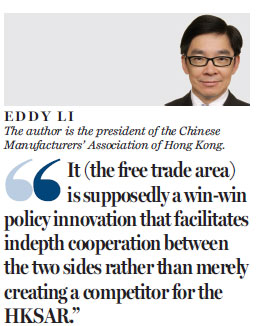HK, Guangdong should only engage in healthy competition
Updated: 2016-04-11 08:51
(HK Edition)
|
|||||||||
I mentioned in my previous articles published in this column that the shopping malls selling Hong Kong products in Shenzhen's Qianhai are in effect threatening Hong Kong's retailers. On one hand, I was more than thrilled to see that "Made in Hong Kong" goods are still reputable and popular among mainland consumers. On the other hand, I couldn't help but worry about the tourism and retail sectors in Hong Kong which are already suffering a decline in business. This new development in Qianhai has sounded an alarm bell for Hong Kong: If the mainland's free trade zones continue to expand and develop, chances are Hong Kong will lose its competiveness.
According to the policy framework of the Implementation Plan for the Construction of Guangdong Free Trade Zone, the free trade areas administered by the province can develop cross-border e-business, including in-bond display, online transaction, and warehouse logistics. The Qianhai district, in this case, should abide by the terms and develop overseas e-commerce as its main business, with a small volume of traditional retail business as a supplement to the online trade. The fact, however, is quite the opposite. The shopping malls in Qianhai are essentially doing traditional retail business; and although labeled as Hong Kong-funded and operated by Hong Kong companies, they benefit only the large-scale chain stores while harming the small retailers and tourism-related industries in Hong Kong.
In last month's two sessions held in Beijing, as a Chinese People's Political Consultative Conference member, I submitted a proposal suggesting that Hong Kong and the Guangdong Free Trade Zone should only engage in healthy competition, which I illustrated mainly with the case of Qianhai. I hope the central and Guangdong governments will realize the real function of the free trade area. It is supposedly a win-win policy innovation that facilitates indepth cooperation between the two sides rather than merely creating a competitor for the HKSAR. This proposal was, luckily, highly valued by the authorities, and it is promised that a pertinent panel will be established to solve the problem.
It is well known to all that the establishment of the Guangdong Free Trade Zone reveals Beijing's intention to promote further integration of trade among Guangdong, Hong Kong and Macao. As a pilot area for collaboration, the plan ultimately aims to forge a bay area which generates economic effects comparable to those of the New York Bay Area, San Francisco Bay Area and Tokyo Bay Area - the existing three most competitive bay areas in the world.
Those who are familiar with the global economic situation will recognize bay area economies as a very prominent highlight after World War II. A bay area comprises a number of coastal cities which are geographically adjacent. In order to avoid vicious competition, these cities make full use of their respective advantages and complement each other. In our case, not only the economic performance, but also the competitiveness of the whole bay area will be greatly enhanced.
This is why the framework of the Guangdong Free Trade Zone has been drawn up in strict conformity with the guideline of avoiding disorderly competition. The Overall Planning for the Development of the Qianhai Shenzhen-Hong Kong Modern Service Industry Cooperation Zone has identified six pilot areas for cooperation with Hong Kong. These include finance, taxation, legal services, human resources, education and medical services, and telecommunication. Retail industry and duty-free stores are not included.
I suggest the central government should, first of all, urge Guangdong province to review its free trade zone policies and execute them accordingly. The operation of traditional retail businesses inside the free trade zone should be restrained so as to avoid having a negative impact on the retailers operating under normal business conditions in the peripheral areas. Second, the central government needs to promote reasonable allocation of resources in the bay area, playing the role of a coordinator between Hong Kong and Guangdong. Only with healthy competition and reasonable division of work can the two sides create a win-win situation and progress together.

(HK Edition 04/11/2016 page9)